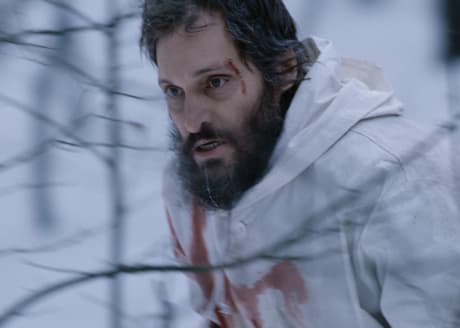Having been the foremost cinematic voice for Polish expatriates and free market criticism back in the '70s and early '80s, occasionally dabbling in forms of mental instability and youthful anti-establishment irreverence as a mode of psychosis, Jerzy Skolimowski was somewhat of a cult figurehead, making fringe movies rarely accessible to the mainstream.
Never quite matching the success of the shrewd, polemical Moonlighting critically or commercially, he dropped out of the filmmaking scene for 17 years, coming back recently with non-linear psychological thriller Four Nights with Anna and this, the deceptively simple Essential Killing.
Fortunately, it seems that time away hasn't hindered the Polish master director, since both films, while incredibly different, demonstrate assured discipline and focus, exploring unsavoury aspects of human instinct with a distinctive format.
With minimal dialogue, uttered only by secondary, incidental characters, Killing follows an Islamic insurgent (played with surprising restraint and consistency by Vincent Gallo) that's repeatedly backed into corners by the American military, forced to kill, essentially, in order to survive. Captured and tortured after blowing away a group of soldiers with a rocket launcher, he makes an unlikely escape while being transported through wintry Poland and is then faced with a variety of survivalist obstacles while transversing the wilderness.
Initially, his actions seem reasonable given the scenario, bringing into question vilification and criminal intent, eschewing some vague, potentially glib political subtext. The title seems quite literal, challenging the audience's perspective on war. As the film progresses, his decisions become more challenging, since the Polish citizens he encounters are often minding their own business, working and even breastfeeding.
From here, the story becomes that of learned behaviour and instinct, taking a decidedly more interesting and compelling psychological route. His journey through the wild is often mirrored by the animals he encounters, whether they passively acknowledge his existence or actively engage this less versed, incapable newcomer. The implication being that removal from society exacerbates unembellished instincts and without the vacuum of social niceties and order, we look ridiculously out of place.
Without a single conversation or secondary storyline to remove us from the action at hand, we are forced into the moment and resulting analysis, which actually benefits the intended message. It seems that even with 17 years away from the craft, Skolimowski is still a master of thought-provoking, unique cinema.
(W2 Media)Never quite matching the success of the shrewd, polemical Moonlighting critically or commercially, he dropped out of the filmmaking scene for 17 years, coming back recently with non-linear psychological thriller Four Nights with Anna and this, the deceptively simple Essential Killing.
Fortunately, it seems that time away hasn't hindered the Polish master director, since both films, while incredibly different, demonstrate assured discipline and focus, exploring unsavoury aspects of human instinct with a distinctive format.
With minimal dialogue, uttered only by secondary, incidental characters, Killing follows an Islamic insurgent (played with surprising restraint and consistency by Vincent Gallo) that's repeatedly backed into corners by the American military, forced to kill, essentially, in order to survive. Captured and tortured after blowing away a group of soldiers with a rocket launcher, he makes an unlikely escape while being transported through wintry Poland and is then faced with a variety of survivalist obstacles while transversing the wilderness.
Initially, his actions seem reasonable given the scenario, bringing into question vilification and criminal intent, eschewing some vague, potentially glib political subtext. The title seems quite literal, challenging the audience's perspective on war. As the film progresses, his decisions become more challenging, since the Polish citizens he encounters are often minding their own business, working and even breastfeeding.
From here, the story becomes that of learned behaviour and instinct, taking a decidedly more interesting and compelling psychological route. His journey through the wild is often mirrored by the animals he encounters, whether they passively acknowledge his existence or actively engage this less versed, incapable newcomer. The implication being that removal from society exacerbates unembellished instincts and without the vacuum of social niceties and order, we look ridiculously out of place.
Without a single conversation or secondary storyline to remove us from the action at hand, we are forced into the moment and resulting analysis, which actually benefits the intended message. It seems that even with 17 years away from the craft, Skolimowski is still a master of thought-provoking, unique cinema.
